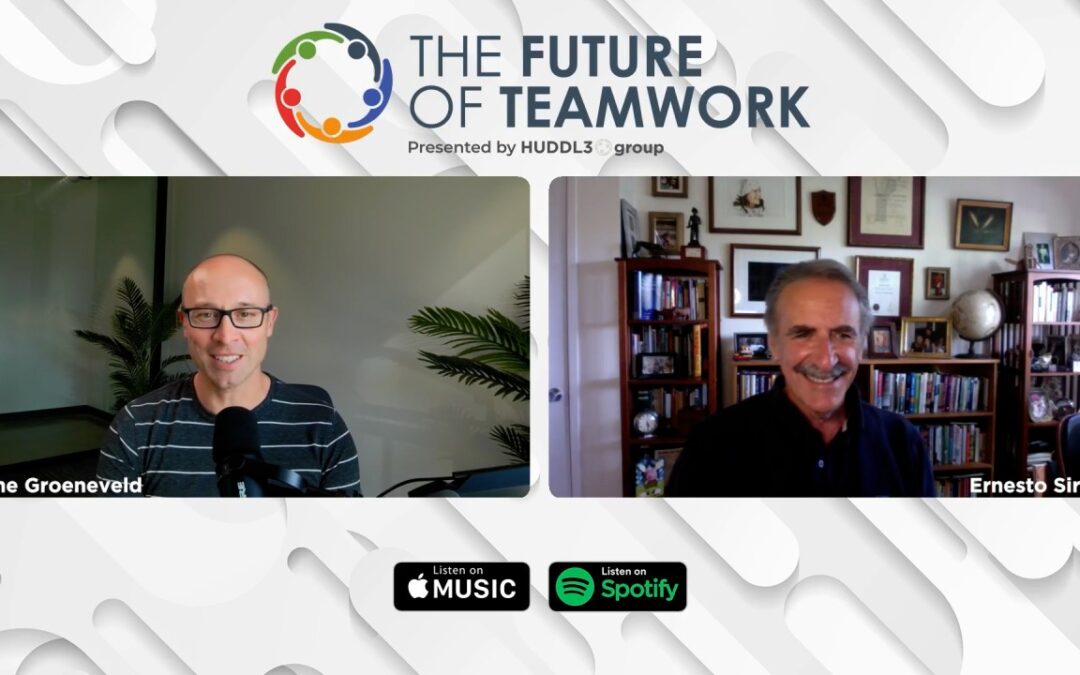Last week on the Future of Teamwork podcast Dane spoke with Dr. Ernesto Sirolli about the role of outsiders trying to help others meet a goal. Dane’s discussion with Dr. Sirolli highlighted the importance of utilizing Georg Simmel’s concept of the Stranger in our organizations.
The Sirolli Institute
The Sirolli Institute was founded in 1985 by Ernesto Sirolli. The Sirolli Institute trains people in enterprise facilitation. Enterprise facilitators are locally trained individuals who go back into their communities and help entrepreneurs successfully implement their business ideas. The enterprise facilitator acts as a free and confidential support system who works with the entrepreneur or corporation for as long as needed.
However, they actively work so that the business doesn’t become dependent upon their existence. If an enterprise facilitator makes the entrepreneur’s business success depend upon the enterprise facilitator, the Sirolli Institute will dismiss them. They exist to help entrepreneurs operate a sustainable company. Once their job is complete, they leave the project. Thus, the enterprise facilitator is similar to Simmel’s concept of the Stranger.
The Stranger
Simmel’s work often investigated group dynamics, asking questions like, ‘How do group dynamics shift when they move from being comprised of two people to three?’ In The Stranger, Simmel explores members of the groups who are in the group but not of the group (Simmel 1971). Simmel notes that Strangers are simultaneously far away and close. They are knowable and unknowable. Simmel differentiates the Stranger from the Wanderer and the Outsider. The Outsider has no relation to the group whatsoever, while the Wanderer is “here today and gone tomorrow.” The Stranger, on the other hand, is a member of the group, but they are not of the group. Think about Mr. Belvedere or Fran Fine, aka “The Nanny.” Both are trusted and valued members of the household, but they are not part of the family (initially, at least).
Simmel notes that Strangers provide the following benefits to groups:
- People can confess their secrets or sins to the Stranger because the Stranger has no actual relevance to their life – if the Stranger knows your secret, it likely has little bearing on your life.
- Strangers are good at being objective due to being somewhat untethered to the group. Therefore they can provide essential and undiscovered insights.
- Strangers often perform jobs that group members may not want to do because of their unique status in the group. Strangers can do the hard or dirty work.
In many ways, Dr. Sirolli’s Enterprise Facilitators act as Strangers. They are in the group to help grow the business, but it is not their business. In doing so, they can absorb the organization’s inner workings – both good and bad – and see how the sausage is made. They can remain objective and free from hurt feelings when a business idea or model needs to be rejected. They are not a government or corporate entity who may have special interests related to an agenda that is counterproductive to the business’s goals. They are there to act as an impartial entity whose goal is to help the business become sustainable.
Using the Stranger in Organizations
Dr. Sirolli has put into practice what Simmel articulated many years ago. Organizations can be helped by having a “Stranger.” Organizations should increasingly think about the advantages of bringing a Stranger into a department, initiative, or the business as a whole for a variety of reasons:
- People may feel more comfortable sharing concerns about a project or department with the Stranger. The role of the Stranger here is to create a space for people to air concerns and possibly help people refine how they’d like to express their concerns.
- The Stranger can bring a unique, unbiased perspective to the business. They may be able to help the organization problem solve an issue where previously held perspectives are clouding the ability to see all possible options.
- The Stranger might be willing to perform a task that the business has culturally defined as no longer desirable. In doing so, the Stranger may help the organization see how vital the task is, provide respite for some individuals from performing the task, push the organization forward by carrying out a duty that others had been unwilling to do, or change company culture so that the task is no longer seen as undesirable or verboten.
The Sirolli Institute’s Enterprise Facilitator position helps highlight the valuable nature of the Stranger. By being in the group but not of the group, the Institute provides an essential sounding board, an objective observer primed with an open mind for new and big ideas, and a willing hand ready to provide essential and undiscovered insights. Other organizations would greatly benefit by taking a page out of Sirolli Institute’s playbook.
References
Simmel, Georg. 1971. “The Stranger” pp. 143-149 in On Individuality and Social Forms: Selected Writings edited by Donald N. Levine. Chicago and London: University of Chicago Press.


Great article! I really appreciate the clear and detailed insights you’ve provided on this topic. It’s always refreshing to read content that breaks things down so well, making it easy for readers to grasp even complex ideas. I also found the practical tips you’ve shared to be very helpful. Looking forward to more informative posts like this! Keep up the good work!